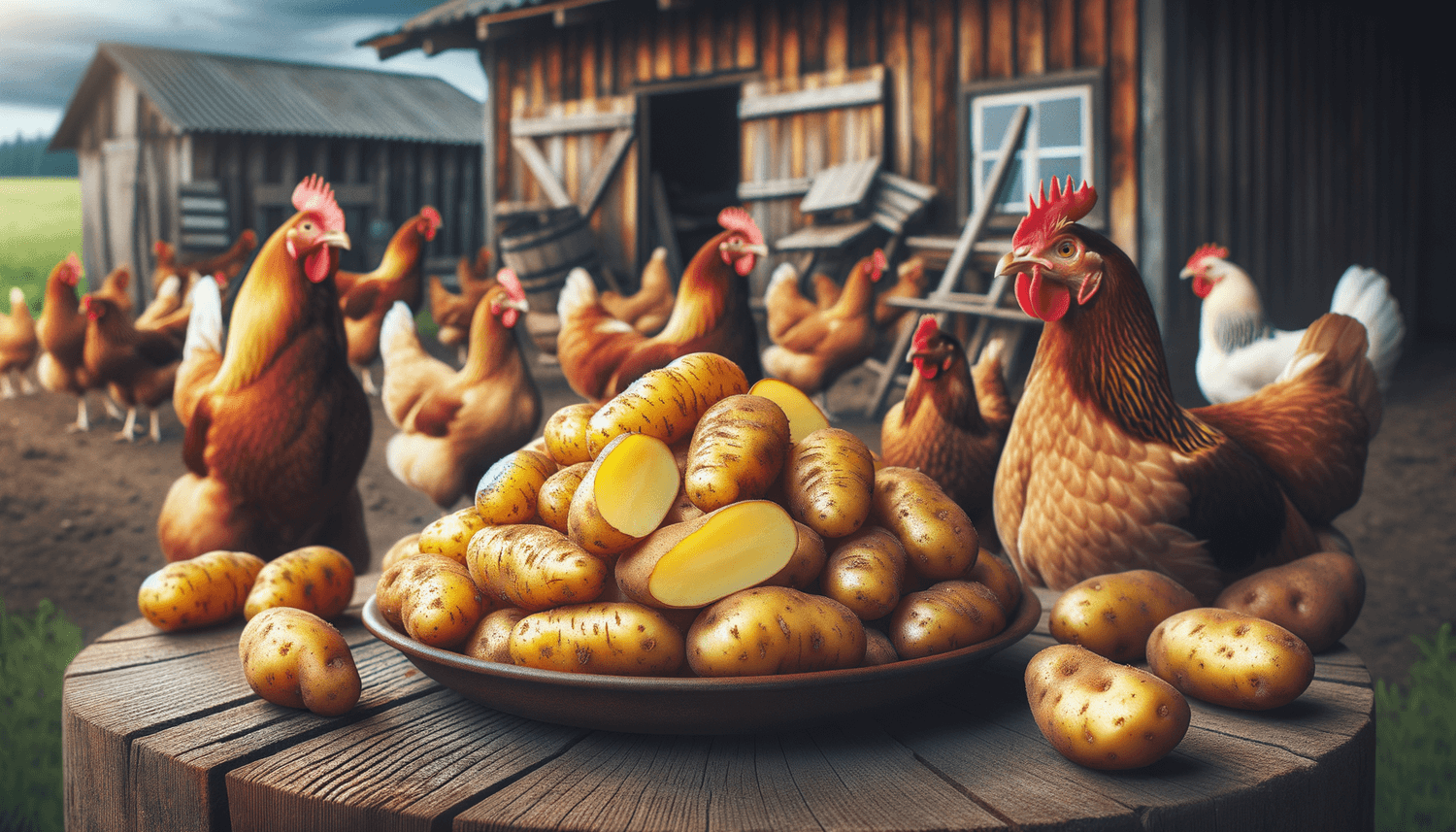There’s nothing better than a good ol’ potato dish for us humans, but have you ever wondered if your feathery backyard friends can partake in the potato party too? In this blog post, we’ll be pecking at the question: “Can Chickens Eat Potato Skins?” From the drive-thru to the dinner table, potato skins are everywhere, and it’s only natural to consider if these starchy delights might tickle the fancy of our clucky companions. We’ll be delving into their nutritional value, discussing the benefits and risks associated with this famous tuber, and most importantly, teaching you how to serve up some fluffy and delicious potato skins for your chickens’ balanced diet. So fasten your coop-keeper’s apron and let’s journey to the world of potato indulgence for chickens!
Can chickens eat potato skins?
Yes, chickens can eat potato skins, but there are some important caveats to consider. Potato skins are safe for chickens when they are cooked and free from any green parts or sprouts, as these can be toxic due to the presence of solanine. In moderation, cooked potato skins can be a nice treat for your backyard flock, providing nutrients without posing health risks.
A balanced diet for happy chickens
Just like humans, chickens need a balanced diet to maintain optimal health and wellbeing. A chicken’s diet should primarily consist of a high-quality chicken feed, which is specially formulated to provide the necessary nutrients, vitamins, and minerals essential for their growth and egg production. This chicken feed should make up around 80-90% of their diet, ensuring their nutritional needs are met and they are able to live a healthy, productive life.
The remaining 10-20% of their diet can be a bit more fun and flavorful, consisting of treats like fruits and vegetables. These tasty morsels offer both physical and mental stimulation for your backyard flock, while also providing additional nutrients that can boost their overall health. Like with any treat, though, moderation and variety are key! Make sure not to overindulge your feathery friends, as too many treats can unbalance their diet and potentially cause health issues. With the right mix of chicken feed and wholesome treats, your chickens will be clucking with joy and good health!
Nutritional value of potato skins for chickens.
Potato skins can be a source of nutrition for chickens when offered in moderation as a treat. Cooked potato skins contain essential vitamins and minerals that can be beneficial to your backyard flock. Among these nutrients, potatoes are particularly rich in vitamin C, potassium, and vitamin B6, which play a significant role in boosting the immune system, maintaining electrolyte balance, and supporting metabolic processes, respectively.
Additionally, cooked potato skins provide a source of hydration, as potatoes have a high water content. Hydration is important for chickens, especially during hot weather or when they are laying eggs. Furthermore, the fiber content found in potato skins aids in digestion and provides a good energy source for chickens, helping maintain an energetic flock.
However, it is important to remember that potato skins should only serve as a complementary food, forming a small portion of their diet rather than substituting the essential high-quality chicken feed. Cooked potato skins can provide valuable nutrients for your chickens, as long as they are free of harmful substances and offered in moderation along with other wholesome treats.
Nutrition table of potato skins for chickens.
| Information | Description |
|---|---|
| Nutritional Value | Rich in vitamin C, potassium, and vitamin B6 |
| Suggested Serving Size | Small, occasional treat for chickens |
| Safe Feeding Practices | Offer only cooked, green-free potato skins in moderation |
| Preparation | Cook potato skins and remove any green parts before serving |
| Potential Risks | Green parts and sprouts contain toxic solanine |
| Hydration | Potato skins have a high water content and help with hydration |
| Digestion | Fiber in potato skins aids in digestion |
| Seasonal Availability | Potatoes are available throughout the year |
| Other Benefits | Potato skins provide energy and support the immune system |
Preparing potato skins for your chickens
Preparing potato skins for your chickens is easy and can be effortlessly incorporated into your kitchen routine. When you’re peeling potatoes for your own meal, save the skins and follow these simple steps:
- Clean the potato skins thoroughly, making sure to remove dirt and debris.
- Check for any green parts, sprouts, or moldy spots and discard them, as they contain toxic solanine.
- Cook the potato skins by boiling, steaming, or baking. Avoid frying or adding any seasonings or unhealthy oils.
- Once cooled, you can offer the cooked potato skins to your chickens. Remember, the key is moderation, so don’t over-feed your flock.
Finding the right balance – other treats for chickens
While potato skins can provide a nutritious snack for your chickens, introducing a variety of treats is essential to maintain their excitement and ensure a diverse nutrient intake. Here are some additional healthy treats you can offer:
- Fruits: Apples, strawberries, raspberries, blueberries, and bananas are all chicken favorites.
- Vegetables: Leafy greens, broccoli, pumpkin, and carrots provide a nutritious nibble.
- Grains and seeds: Oats, sunflower seeds, and cooked quinoa serve as a wholesome treat.
- Protein: Plain yogurt or scrambled eggs can make an excellent source of protein for chickens.
Remember, treats should always constitute a minor portion of your chickens’ diet. With a variety of healthy snacks and a balanced diet, your chickens will thrive and reward you with delicious eggs and delightful clucking companionship.

















